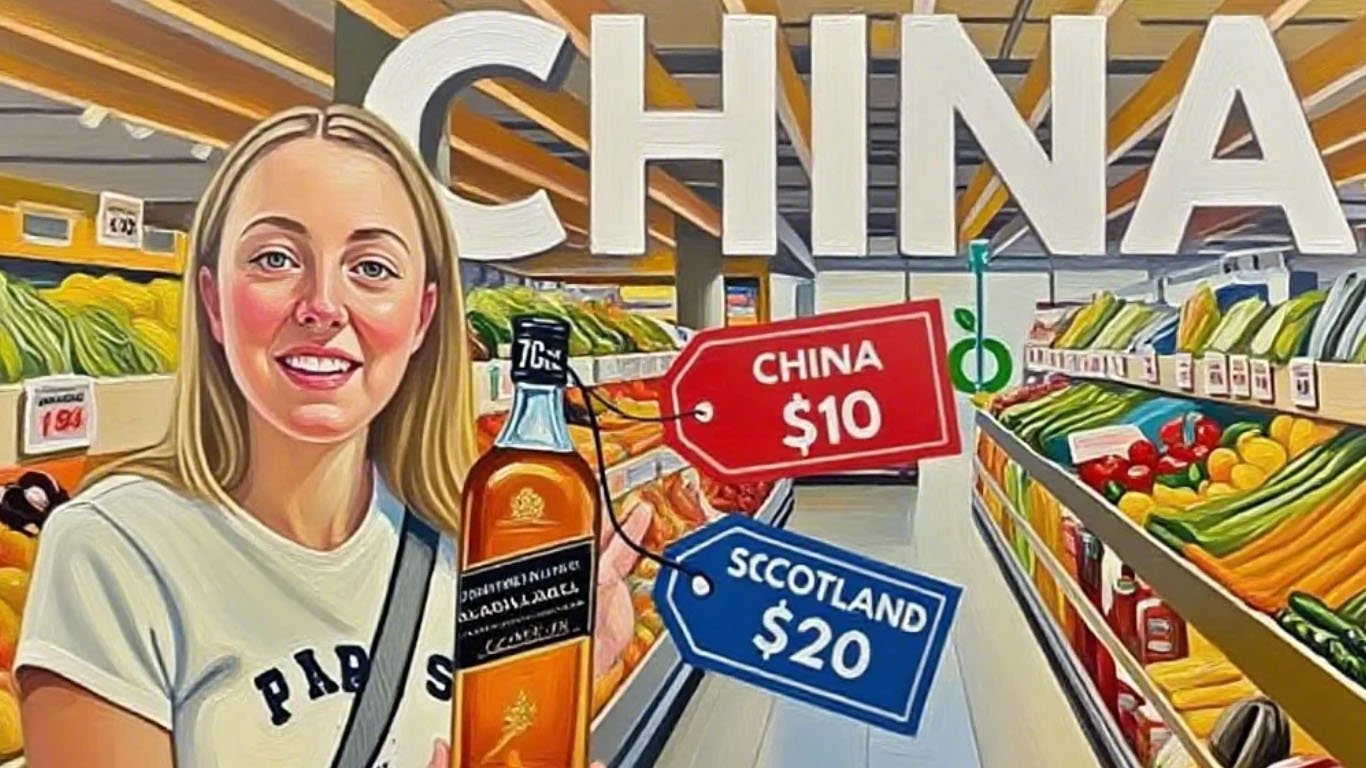Exploring a Walmart in China reveals surprising differences in grocery prices compared to Asda in the UK. From alcohol to fresh produce, this article,
Exploring a Walmart in China reveals surprising differences in grocery prices compared to Asda in the UK. From alcohol to fresh produce, this article, created for allwinchina.org, compares costs of everyday items, highlighting China’s affordability and cultural uniqueness. Join us as we navigate the aisles to uncover how shopping in China stacks up against the UK.
Supermarket Layout: A Cultural Shift
Walmart China’s layout surprises UK shoppers. Unlike Asda’s fresh produce at the entrance, China’s Walmart opens with dairy, less popular here due to widespread soya milk consumption. Cheese is scarce—only three mozzarella types and some processed slices—reflecting minimal cheese in Chinese diets. In contrast, Asda offers walls of cheese varieties, showcasing dietary differences.
Alcohol: China’s Bargain Bottles
Alcohol prices in China are strikingly lower, despite a modest drinking culture. A 70cl bottle of Captain Morgan’s Spiced Rum costs £7 (69 RMB) in China, but £17 in Asda. Absolut Vodka (70cl) is £9.90 in China, over half off the UK’s £20. Johnnie Walker Red Label, a Scottish whiskey, is £10 in China versus £19 in Asda. Even premium Dalmore Highland Single Malt is £53.54 in China, compared to £72 in the UK. High UK taxes, like a 70% spirit tax and Scotland’s minimum alcohol pricing, drive these gaps.
Dairy: Mixed Results
Dairy prices vary. A liter of cow’s milk costs £0.93 in China, slightly less than Asda’s £1.20. However, cheese is pricier in China due to low demand—a 42 RMB (£4.30) bag is double Asda’s £2.50. Yakult, a probiotic drink, is £1.20 for five in China, but £3.70 in Asda, nearly three times more. Cultural preferences shape these differences, with dairy less central in China.
Meat and Seafood: Fresh and Affordable
China’s fresh meat and seafood, displayed on ice, are cheaper and higher quality. A pork chop costs £2, two drumsticks £1.50, and a large chicken breast £1. In Asda, a kilogram of mince costs £9, far pricier. UK meat, often imported from distant countries like Brazil, feels fatty and lower quality compared to China’s freshly cut offerings.
Beverages: China’s Clear Win
China’s drinks are dramatically cheaper, unburdened by the UK’s sugar tax. A 12-can pack of Coca-Cola costs £2.50 (24.99 RMB) in China, versus £8.25 in Asda. A single Pepsi bottle is 30 RMB (£0.30) in China, compared to £2 in the UK. Local beers like Tsingtao (six large bottles) cost £3 in China, while Asda’s imported Asahi (10 cans) is £15, despite both facing import taxes.
Snacks: Unique and Inexpensive
Chinese snacks, like wasabi peas (£1 for a large bag) and sunflower seeds, are affordable and unique. In the UK, similar snacks cost double. Pick-and-mix options, including pickled vegetables, grilled pork fillets, and duck neck, reflect local tastes but wouldn’t work in the UK due to theft concerns. Sweets like dried mango differ from Western sugary treats, highlighting cultural contrasts.
Toiletries: China’s Edge
Toiletries favor China. A 250g tube of Colgate toothpaste costs £1.70 in China, but half that size in Asda is £5.98, nearly six times more per gram. Gillette Mark III razor blades are £12 in China, £17 in the UK. A face wash costs £7 in China, double in Asda. China’s larger packaging and lower prices stand out.
Fresh Produce: Mostly Cheaper
Fresh produce in China is generally affordable. A trio of pineapple, watermelon, and cantaloupe costs £2, though street vendors sell whole watermelons for £1. A single pepper is £0.70 in China, versus £1.70 for three in Asda, making the UK slightly cheaper here. Eggs (12) cost £1.40 in China, half Asda’s £3, despite recent UK price hikes.
Prepared Foods: Unbeatable Value
China’s prepared foods are a steal. A fresh bun with chow mein and a fried egg costs £1, as does a chicken box. These freshly made, hot options have no direct UK equivalent, where pre-cut fruit like melon trios carries a high markup (£2 in both countries, but less value in the UK).
Pasta and Coffee: Rare UK Wins
Pasta, less common in China, is pricier at £2.70 for a high-end brand versus £1.80 in Asda for 500g. Coffee, like 200g of Nescafé, is nearly identical—£6.50 in China, £6.70 in Asda. These rare cases show the UK occasionally competes, especially for Western staples.
Cultural Context: Taxes and Salaries
UK prices reflect heavy taxes, like Scotland’s alcohol minimum pricing and happy hour bans, aimed at curbing drinking. In Guangdong, average salaries are around 131,000 RMB ($19,000 USD) annually, but with 70 million people, income varies widely. Many products, even imported ones like Chilean wine, cost less in China, raising questions about UK pricing logic.
Conclusion: China’s Cost Advantage
Walmart China consistently outprices Asda UK, especially for alcohol, drinks, meat, and toiletries. Cultural differences, like China’s fresh meat focus and minimal cheese consumption, shape offerings. Despite higher UK wages, China’s lower taxes and efficient supply chains make it a shopper’s haven. Explore more at allwinchina.org.
Comparing Supermarket Prices in China to the UK (Shocking Discovery) 🇨🇳
Author: Alan & Shannon



COMMENTS